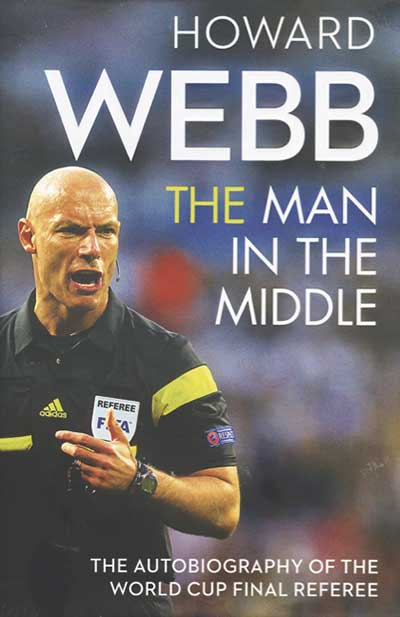
Simon & Schuster, £20
Reviewed by Ian Farrell
From WSC 360, February 2017
Buy this book
The memoirs of a middle-aged football referee are not the sort of sure-fire hit likely to spark publishers into a cut-throat bidding war. So to get a book deal you tend to need some sort of angle, be it Alan Wilkie’s view from the thick of the action as Eric Cantona went crazy, Mark Halsey’s triumph over illness, or the ego-fuelled controversies of a Graham Poll or Jeff Winter.
For Howard Webb, however, Simon & Schuster are hoping that it’s enough of a selling point that he reached the very pinnacle of his profession: taking charge of a World Cup final. Given his much-maligned performance in Johannesburg you might think it’s an odd hook to go for, but the book is all the better for not being simply a procession of triumphs for its subject to boast about. While Webb isn’t lacking in belief or shy of quoting praise, it’s the honesty about his failings that makes his autobiography a surprisingly engaging read.
He manages to come across as a decent, down-to-earth man, but also at times a complex character. Most people will probably know that he was a long-serving policeman, but they may not be aware that he chose that path despite being a miner’s son who witnessed the Battle of Orgreave (or at least its aftermath) first hand. He does at least address the incongruity, but dismisses it in a couple of sentences with little self-analysis.
Where he does open up, and quite movingly, is in discussing his battle since childhood with Obsessive Compulsive Disorder. Despite what might be assumed given his twin careers, it’s not the form of OCD concerned with order that he has to deal with, but rather “intrusive thoughts”. For Webb, the intense concentration required during a game was one of his means of escape.
There are plenty of major events and incidents beside South Africa to keep the story moving: two European Championships, a Champions League final, an FA Cup final, plus the shocking collapse of Fabrice Muamba. There are also internet hate campaigns, death threats, and some inside gossip on divisions and in-fighting among officials. Webb relates it all in a friendly, unpretentious manner and he’s gratifyingly candid about his errors.
Fans of the teams he’s wronged may disagree, but he’s adamant that they were simply honest mistakes and refutes any suggestions of bias or of ducking difficult decisions. Make of it what you will, but he insists that his mere yellow card for Nigel de Jong’s notorious flying kick on Xabi Alonso was the result of an impaired view of the incident, nothing more. It’s interesting to read that with no phone restrictions in place by FIFA, he learned of his blunder at half time through a flurry of texts.
The Man In The Middle gives some genuinely fascinating insight into the difficulties of officiating in the modern game, and Webb’s frankness and self-deprecation are to be commended. Any current Premier League referees with literary aspirations would do well to take notes.